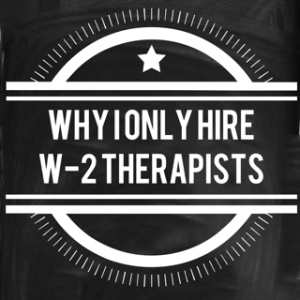 I've noticed that private practice therapist tend to hire additional therapists as 1099 contract employees. Reasons frequently cited for choosing to hire therapists as 1099 employees is that they don't have to pay the therapists taxes. While it may be more "affordable" to hire therapists as contractors, in my experience, there are also "costs." (For an summary of the difference between W-2 and 1099 employees read part 1 in this series. To hear about my employment tax audit adventure read part 2.)
I've noticed that private practice therapist tend to hire additional therapists as 1099 contract employees. Reasons frequently cited for choosing to hire therapists as 1099 employees is that they don't have to pay the therapists taxes. While it may be more "affordable" to hire therapists as contractors, in my experience, there are also "costs." (For an summary of the difference between W-2 and 1099 employees read part 1 in this series. To hear about my employment tax audit adventure read part 2.)
According to the IRS website, the general rule for classifying 1099 independent contractor is "if the payer has the right to control or direct only the result of the work and not what will be done and how it will be done" (italics added). It also states that an employee is not a contract employee if the services "can be controlled by an employer (what will be done and how it will be done)" and if "the employer has the legal right to control the details of how the services are performed."
In consulting with therapists around the U.S. I've heard about some of the "costs" of hiring 1099 employees. Some of the costs high turnover rates due to the part-time and often temporary nature of contract employee relationships. Some of those "costs" include lack of control over how and where therapy is done, inability to require specific paperwork, inability to require attendance at staff meetings or trainings, inability to request that therapists network and participate in community outreach to boost referrals.
Here are the four main reasons I only hire therapists as W-2 employees:
1) Overall Cohesiveness
My vision for Wasatch Family Therapy has always been to build a cohesive team with a shared long-term vision of providing excellent clinical services to clients across the lifespan from an attachment perspective, not just have a group of therapist doing any kind of therapy they choose. Now that we have grown into a clinic of 18 therapists at 3 locations cohesiveness is even more crucial. When therapists are hired as 1099 contractors employers are not supposed to tell the contract worker how to do therapy, or make other specific requirements of the worker, such attendance at trainings.
2) Higher Level of Quality Control
If a therapist is going to work under my name and my practice name or "brand", I want to be able to have a say in how, where, and when they do the work. I've spend over 10 years building trust, credibility, and presence in my region and I want to be able to be able provide mentoring, direction, and training in how my clinical team provides services.
3) Ability to Require Certain Activities
I want to be able to require certain activities from my team members that hiring them as 1099 workers does not allow me to do. We have streamlined forms for notes and documentation in our EHR system. I require each therapist to engage in at least one outreach or networking activity each month in order to create strong referral sources. I require attendance at two monthly staff meetings, and a certain level of professional appearance at the office.
4) Implication of Long-Term Relationship
I am not interested in hiring temporary therapists to provide services. Hiring 1099 workers generally implies a short-term relationship. I am interested in hiring therapists who have a shared vision and who I can invest in long-term, and who will invest in building the practice long-term. I want to build mutually beneficial relationships not just provide services. Hiring therapists as W-2 employees shows a greater long-term commitment to them to build their practice for the long haul. I also allows me to expect a greater commitment from them.



 Why did you decide to open a private practice?
Why did you decide to open a private practice?
As healers, we genuinely like to do our work. Guiding clients through the therapy process and seeing them make progress is why we do what we do. But if you're in private practice, you know there's a lot going on in the back end and that it's crucial to run an efficient and organized business.